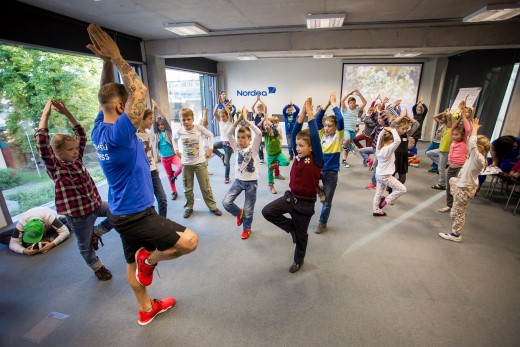One Hundred Pupils Develop Money-handling Skills at a Creative Afternoon Workshop from Nordea’s Personal Finances Management Course | Luminor
One Hundred Pupils Develop Money-handling Skills at a Creative Afternoon Workshop from Nordea’s Personal Finances Management Course
As the autumn study season starts, the finance instructors from Nordea naudas skola (Nordea’s course in managing personal finances), in cooperation with experts from the Bank of Latvia, organised a creative finance-related afternoon workshop. In total, over 100 pupils from various schools and their parents took part. The experts shared practical advice and recommendations regarding the value of money and its significance in attaining personal goals.
In order to improve the pupils` knowledge about money and to teach them to handle it in a more skilful way, during the creative afternoon workshop of Nordea naudas skola (Nordea's course in managing personal finances) that was organised on 14 and 15 September, pupils between eight and thirteen years old, together with their parents, found out more about money, its value and the role it plays in attaining set goals, as well as learned about various financial tools for creating savings and learned how to identify the anti-forgery elements of euro banknotes.
Anna Fišere-Kaļķe, Deputy Head of the Private Individuals’ Service Department of Nordea Bank and Head of Nordea naudas skola says: “At the creative afternoon workshop of Nordea naudas skola, we invited pupils and their parents to answer questions about money to find out how their understanding and, possibly, values, differ. It can be seen that children follow the train of thought of their parents, and we are happy that the opinions seldom differ. This once again shows that parents should explain finance-related issues to their offspring as early as in their early childhood. The only way to promote understanding is by building a dialogue with children.”
A short video story about children’s and parents’ answers regarding money can be found here.
“Recognising the main anti-forgery and design elements of euro banknotes and coins that are used daily is also important for the youngest pupils. Statistical data shows that the likelihood of obtaining a forged euro bank note is slim; however, children trust easily and this is why it is important to explain to them what is characteristic of euro coins and how to easily tell a genuine euro banknote from a forged one, so that they would not end up in unpleasant situations. Also, a child might store a euro banknote that was a gift from Grandma incorrectly, for example, by hiding it inside the hamster’s cage. Andris Tauriņš, money expert at the Bank of Latvia, showed the children both genuine and forged euro banknotes, let them test their authenticity on their own, explained what to do if they happen to be given a forged or damaged euro banknote and what happens to money if it is stored incorrectly. During the class, the children watched short films courtesy of Naudas skola, the course in managing personal finances organised by the Bank of Latvia, and tested their readiness to take part in the Euro Run ECB competition for students in a mini competition. The number of questions that the money expert was asked showed that money matters genuinely interest children,” explains Antra Slava, editor of the Naudas skola economics education website of the Bank of Latvia.

“Pupils in their first year of school are in contact with money to the degree that involves their responsibility for using the pocket money given by their parents in a sensible way. Some pupils have more [pocket money], some have less, but the one thing that is certain is that every pupil has to make a decision. Will he or she be able to set aside some cents to save up sufficiently to buy something they fancy? Or will they spend it all on sweets? This is what the eight year olds have to decide themselves. This is the age when it is difficult to talk about money, which they do not directly earn. It should be [discussed] using analogies, with examples that a child understands. As many things in life happen following the same scenario, the matter of working out and health during one’s entire life can be successfully linked to money matters. If a pupil confirms that he or she is ready to eat in a healthy way to enter adulthood having a strong body, we can hope that by laying the foundations of the value system as early as during the school years the young person will refrain from poorly thought-out decisions and risks later on in adolescence,” says Kaspars Ozoliņš, fitness instructor at the DCH Fitness Studio and a TV personality.
Photos from the Nordea naudas skola creative afternoon workshop are available here.
About Nordea naudas skola
Within the framework of the financial education programme Nordea naudas skola (Nordea’s course in managing personal finances), we here at Nordea Bank are holding lectures for the fourth time to promote children’s and young people’s understanding of financial issues. At the creative afternoon workshop, children learn by the hands-on methodology used and get advice on how to handle and save money, how to identify signs of money forgery and other things, and, most importantly, information that can be applied in practice in daily life. So far, over 1,600 children and adults have taken part.
More about Nordea naudas skola www.nordea.lv/naudasskola
Additional information:
Signe Lonerte, Head of Public Relations, Nordea Latvija, tel.: 6 700 5469, mob.: 29 116 146, [email protected]
